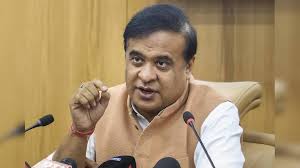
Himanta Hails BJP Rule: Says Bengali-Speaking Hindus in Assam "Most Comfortable" in Past Decade

 :
| Updated On: 01-Sep-2025 @ 11:59 am
:
| Updated On: 01-Sep-2025 @ 11:59 amSHARE
Assam Chief Minister Himanta Biswa Sarma, while addressing a programme in Silchar, emphasized that Bengali-speaking Hindus in Assam have been “most comfortable” during the Bharatiya Janata Party’s (BJP) 10-year rule in the state. He credited his government for systematically addressing their long-standing issues, ensuring their security, and protecting their rights.
Sarma outlined the steps his government has taken to resolve problems faced by Hindu-Bengalis, particularly focusing on Aadhaar restoration and halting new cases related to citizenship disputes. He claimed that many such issues, which had caused immense difficulties in the past, have been resolved “one by one,” enabling Bengali Hindus to live peacefully and with dignity under the BJP’s governance.
The Chief Minister further highlighted his government’s strict stance against illegal infiltration from Bangladesh. He explained that security forces have been actively preventing illegal immigrants from entering Assam through multiple entry points such as Tripura, Dawki in Meghalaya, Mankachar, and Sribhumi in Assam. Although he refrained from sharing specific figures of those pushed back, Sarma assured that effective measures are being taken to block infiltration. He added that steps are being implemented to ensure that such infiltration does not recur in the future.
Discussing the issue of cross-border networks, Sarma pointed out the presence of middlemen (dalaals) who facilitate illegal crossings, charging around ₹20,000 per person. He noted with concern that many of these middlemen are themselves Hindus, particularly in Tripura. His remarks highlighted the internal challenges of dealing with infiltration, which not only involves external actors but also local networks.
In his speech, Sarma also addressed the social and cultural dynamics between Assamese and Bengali-speaking communities. He asserted that linguistic divisions between the two groups have largely faded, with Hindus now identifying more strongly with their religion than with language. According to him, this growing unity strengthens Hindu society as a whole, reducing chances of communal discord.
Responding to allegations made by TMC MP Sushmita Dev that Bengali-speaking Hindus still face difficulties in Assam, Sarma dismissed her criticism as divisive. He accused her of attempting to create splits within Hindu society, asserting that “we are one.” Sarma also questioned Dev’s credibility, pointing out that she had left Assam to represent West Bengal in the Rajya Sabha and now comes to the state “as a guest.” He implied that leaders who abandon their place of origin lose moral authority to challenge those who remain and work for their people.
Sarma further emphasized the importance the BJP and Prime Minister Narendra Modi accord to the Bengali language. He highlighted that the recognition of Bengali as a “Classical Language” by the central government is proof of this respect. When asked about BJP leader Amit Malviya’s controversial remarks on the Bengali language, Sarma distanced himself, stressing that what matters most is what PM Modi says. He clarified that Bengali is an Indian language, not a “Bangladeshi language,” and therefore it deserves its rightful respect.
In conclusion, Sarma portrayed the BJP’s rule as the most favorable period for Bengali-speaking Hindus in Assam, citing his government’s efforts in safeguarding their rights, ensuring security, fostering communal unity, and promoting cultural recognition. He positioned himself as a leader working systematically and within legal frameworks to achieve lasting solutions, while portraying his political opponents as outsiders attempting to create division.